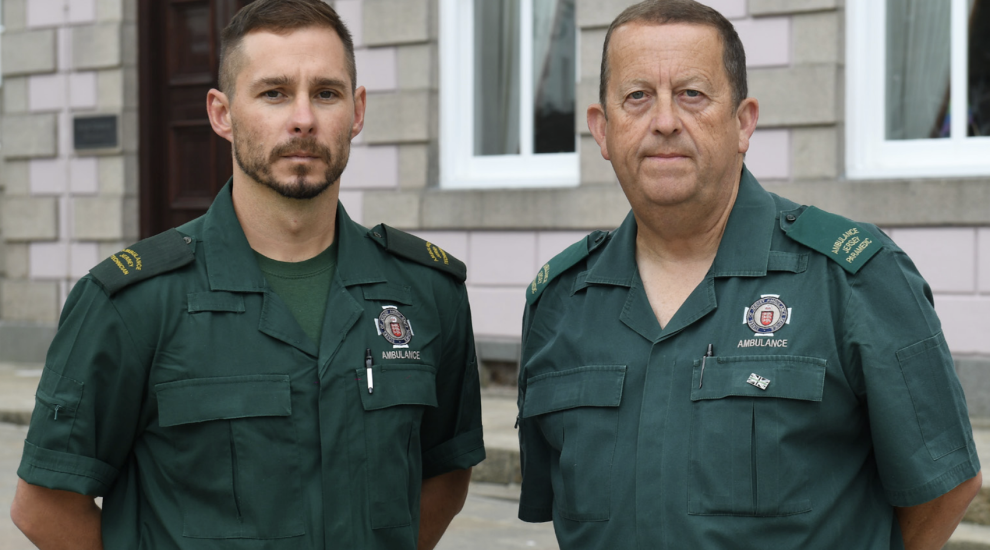


The requirement to put on PPE before dealing with a patient slowed down two paramedics sentenced for not showing a "sense of urgency" towards a man who died from a cardiac arrest following a reported overdose – with one of the pair previously having faced disciplinary action for treating a patient first, the Court of Appeal was told yesterday.
Tom Le Sauteur (36) and John Sutherland (60) appeared in the Court of Appeal yesterday to challenge the two-year conditional discharge handed down to them earlier this year with an appeal largely financed by donations from the public.
The pair were hoping to clear their names after being found guilty of a health and safety breach in relation to their response to 39-year-old Frazer Irvine.
The patient, who called an ambulance in March 2022 when he was suffering the effects of an overdose, later died of cardiac and respiratory arrest.
Despite receiving one of the lowest sentences possible – where their criminal records will be wiped after two years – Le Sauteur and Sutherland said they were determined "fight" the conviction and to challenge the “dangerous” precedent they claimed it could set.
Ambulance and emergency services workers have rallied around their colleagues through peaceful protests and gatherings, and the pair have also received a notable amount of public support.
The public gallery in the Royal Court was filled with relatives and colleagues of the two men when Advocates Ian Jones and Frances Littler presented several arguments challenging the original conviction.
They contended that hindsight was inappropriately used to judge the paramedics' actions, and claimed that the court misunderstood the standards of care required in high-pressure situations.
When handing out a two-year conditional discharge earlier this year, Commissioner Sir John Saunders said the pair did not show a "sense of urgency" to move the patient to hospital and said there was "no danger" in giving him care once police had arrived to assist as back up after the patient became aggressive.
While the Commissioner said the pair were perfectly entitled to call the police and wait for them to arrive, Sir John argued that paramedics should have taken better care to ensure the patient’s airways were clear and he was not at risk of choking on this own vomit.
One of the main points of contention was that the paramedics did not assess Mr Irvine’s condition or clear his airways properly, only doing so after a police officer who was called for backup noticed changes in the patient’s breathing and colour.
Another criticism was that Sutherland left his patient to return inside the flat to gather evidence on possible drug use before trying to take the patient to the ambulance, which caused additional delays.
Advocate Jones, representing Sutherland, repeatedly emphasised that the important period to consider was between 23:13, when the police arrived, and 23:29, when
Mr Irvine suffered a cardiac arrest.
The main focus in determining criminal liability, Advocate Jones argued, was the 16 minutes between the police arriving and the patient going into cardiac arrest.
“The court have said the defendants should not be criticised for actions they did or did not take prior to the police arriving,” the Advocate said.
Advocate Jones also challenged the court's finding that it was safe to assess Mr Irvine immediately after the police arrived, pointing out that the patient remained intermittently aggressive and uncooperative.
He also argued that the requirement for paramedics to wear personal protective equipment (PPE) delayed their ability to act immediately and to remove the vomit from the patient's face.
He explained donning PPE prior to providing treatment was standard practice, adding that Le Sauteur had previously been disciplined for failing to follow PPE protocol, instead opting to treat the patient first.
He said: “There was no dispute that you have to go and put on PPE when someone has been sick. The PPE had to be put on.
“The purpose of the policy is primarily to ensure the safety of the paramedics.”
Addressing criticism about how the paramedics did not put Mr Irvine into the recovery position and failed to wipe vomit from his face, Advocate Jones said the paramedics acted quickly once properly equipped.
He said that only six minutes passed between donning PPE and Mr Irvine's cardiac arrest.
During this time, Sutherland had left him in a position to promote the draining of mucus from the airway, while Le Sauteur cleaned his face.
Advocate Littler, representing Le Sauteur, disputed the court's findings regarding the timeliness of care.
She argued that body-worn camera footage showed Le Sauteur responding within seconds to concerns raised by police officers and carrying out appropriate and systematic assessments to assess the patient's condition.
She argued that Le Sauteur used the AVPU scale, a medical tool for assessing consciousness, and that his actions were consistent with expert advice.
The verdict of the appeal will be announced on Wednesday at 10:00.
The case is being heard by William Bailhache, Helen Mountfield, and Adrian Fulford.
Comments
Comments on this story express the views of the commentator only, not Bailiwick Publishing. We are unable to guarantee the accuracy of any of those comments.